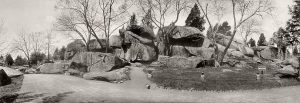Following An Antique Drum

Tuesday, the first of three days of bitter cold. With -3 degrees and a stiff breeze I changed my plans for the morning. On the road in the early morning sun, obliquely illuminating the snow covered fields, the drifts appeared as wind driven wavelets on a frozen lake. Perhaps an image of our lives, frozen wavelets, frozen, with the appearance of motion, simply the repetition of what has gone before,–many times before.
My mind flashed from this frozen landscape to a remembrance of a warm spring morning visit to the Gettysburg battlefield. Gettysburg Pa, was the killing ground for the great three day contest of death between the armies of the North and the South in the Civil War. I remember visiting the Devil’s Den, that outcropping of boulders between the flat wheat field and the edge of the woods. The high ground was held by Federal infantry and artillery. Southern farm boys paid a terrible price, to dislodge their countrymen from their vantage point.*
This took place on a sweltering day July 2nd 1863, a day so filled with lead and iron there was no help or water to drink for the wounded who lay bleeding, thirsty in the hot sun. Some men died forgotten. I think about that. How many were very much like me; anxious to do their duty, to be on the right side of the great issue of their generation, that of loyalty to country or that of the emancipation of enslaved fellowmen?
Consider, if you would these lines excerpted from T. S. Eliot’s magisterial poem, Little Gidding. The highlighted lines are especially meaningful to me.
If I think, again, of this place,
And of people, not wholly commendable,
Of not immediate kin or kindness,
But of some peculiar genius,
All touched by a common genius,
United in the strife which divided them;
If I think of a king at nightfall,
Of three men, and more, on the scaffold
And a few who died forgotten
In other places, here and abroad,
And of one who died blind and quiet,
Why should we celebrate
These dead men more than the dying?
It is not to ring the bell backward
Nor is it an incantation
To summon the spectre of a Rose.
We cannot revive old factions
We cannot restore old policies
Or follow an antique drum.
These men, and those who opposed them
And those whom they opposed
Accept the constitution of silence
And are folded in a single party.
Whatever we inherit from the fortunate
We have taken from the defeated
What they had to leave us – a symbol:
A symbol perfected in death.
And all shall be well and
All manner of thing shall be well
By the purification of the motive
In the ground of our beseeching.IV
The dove descending breaks the air
With flame of incandescent terror
Of which the tongues declare
The one discharge from sin and error.
The only hope, or else despair
Lies in the choice of pyre or pyre-
To be redeemed from fire by fire.
Who then devised the torment? Love.
Love is the unfamiliar Name
Behind the hands that wove
The intolerable shirt of flame
Which human power cannot remove.
We only live, only suspire
Consumed by either fire or fire.
*On July 2, 1863, Smith’s Union battery, with six Napoleon smooth-bores, used the hill to counterfire on Confederate artillery prior to McLaws’ Assault at 5:30 pm. Against Hood’s Assault that started at 4 pm, Devils Den was defended by Birney’s 1st Division as the far left position from The Peach Orchard Salient of the III Corps. The hill was captured when the “First Texas Regiment, having pressed forward to the crest of the hill and driven the enemy from his battery”, and Anderson’s Confederates used the hill for the first attack on The Wheatfield. From near the Slaughter Pen, the 40th New York Volunteer Infantry Regiment forced the 2nd & 17th Georgia regiments of Benning’s Brigade to retreat to Devils Den. Confederate sharpshooters were stationed between the rocks to fire upon Union soldiers at Little Round Top, among their victims being General Stephen H. Weed and Lieutenant Charles E. Hazlett. Hazlett’s guns counter-fired upon them, and many were killed from the concussion of air.
2 thoughts on “Following An Antique Drum”
I have felt a calling to return to Gettysburg before my own time runs thin. Thank you for the reminder that this place of conscience and solitude waits for me, patiently, within unremembered suffering lodged among the rocks of the conflagration that was our collective past.
A trip to Gettysburg would be a outstanding road trip. I’d love to go back. It seems sacred ground to me. We sacrificed for ideas that transcended ourselves. I think sacrifice is always called for.